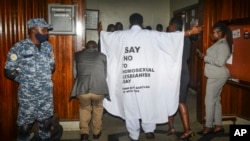Uganda on Tuesday condemned the Western response to the East African country's new anti-LGBTQ law, considered one of the harshest in the world, and said sanctions threats from donors amounted to "blackmail."
The law signed by President Yoweri Museveni carries the death penalty for "aggravated homosexuality," an offense that includes transmitting HIV through gay sex.
Its enactment, announced on Monday, drew immediate rebukes from Western governments and puts in jeopardy some of the billions of dollars in foreign aid the country receives each year.
U.S. President Joe Biden threatened aid cuts and other sanctions, while Secretary of State Antony Blinken said the government would consider visa restrictions against Ugandan officials.
EU foreign policy chief Josep Borrell said the law would impact Uganda's ties with international partners.
In the Ugandan government's first detailed comments since Museveni signed the law, Information Minister Chris Baryomunsi rejected the condemnation.
"We do not consider homosexuality as a constitutional right. It is just a sexual deviation which we do not promote as Ugandans and Africans," he told Reuters.
"While we appreciate the support we get from partners, they must be reminded that we are a sovereign country and we do not legislate for the Western world. We legislate for our own people here in Uganda. So that kind of blackmail is not acceptable."
Ugandan activists and lawyers filed a lawsuit on Monday against the law. They said it encourages discrimination and stigmatization and allege it was passed without meaningful public participation.
In an interview, U.N. High Commissioner for Human Rights Volker Türk told Reuters he expects the courts to agree.
"I hope that the judiciary is going to look into it and I can tell you, if they look at human rights law, their own constitution, they will find it in violation of it," Türk said, describing the law as "devastating."
He did not elaborate on which aspect of the constitution had been violated.
Asked about alleged breaches of international law, a spokesperson later added: "a whole range," saying these included the rights to equality, non-discrimination and to life.
France's TotalEnergies TTEF.PA, which is developing a $3.5 billion oil pipeline between Uganda and Tanzania, told Reuters on Tuesday that its CEO had expressed the company's views on the bill to Museveni before he signed it.
"Respect for others is a core value at TotalEnergies," a spokesperson said.






